
Sustainability Report 2023
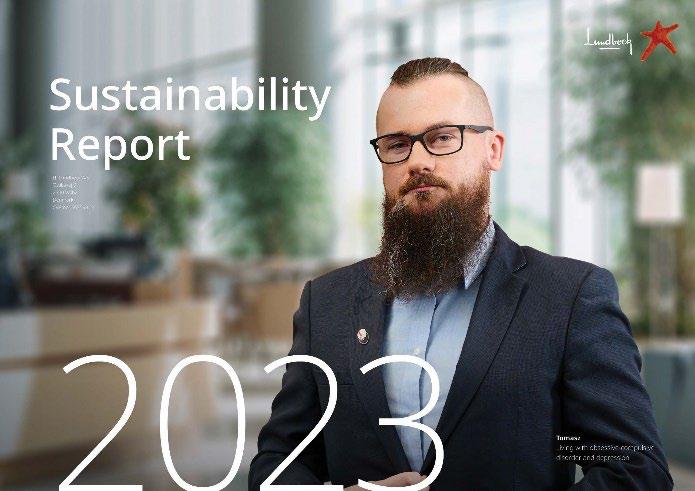
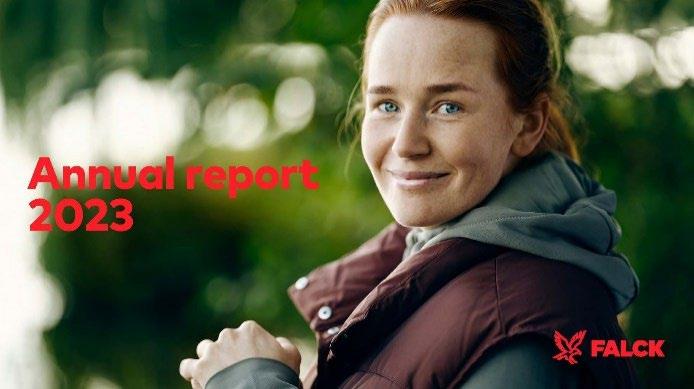
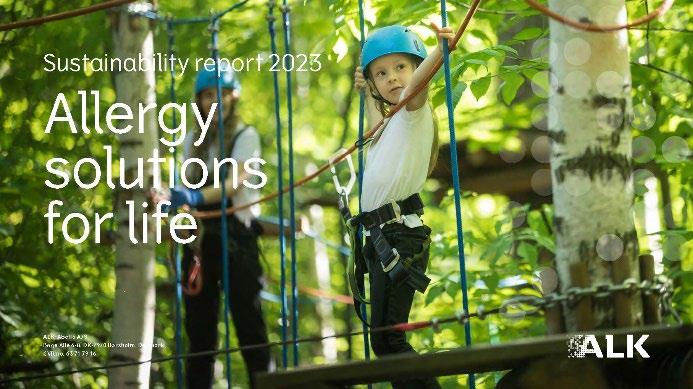
Lundbeck Foundation Sustainability Report 2023 Page 2 Key 2023 Figures 3 Commitment to society 4 Our business model 6 Strategic Ownerships 7 Asset management 8 Partner to Society 10 ESG at the Lundbeck Foundation 13 Definitions of calculations 16 H. Lundbeck A/S 17 ALK-Abelló A/S 70 Falck A/S 114 Section 99a of the Danish Financial Statements Act This report represents the statutory consolidated statement of the Lundbeck Foundation on corporate social responsibility (CSR) in accordance with section 99a of the Danish Financial Statements Act. The report includes the Sustainability Reports for 2023 of Lundbeck and ALK as well as the Management’s review of Falck’s Annual Report 2023 – each of which outlines company-specific policies, activities and results for 2023 . Contents Lundbeck FoundationSustainability Report 2023
Find and follow us LinkedIn X Facebook Instagram
Key 2023 Figures
+19 million patients reached through the group
315DKKm invested in early-stage biotech companies
+4,000DKKm spent on R&D through the Group
+33,000 jobs sustained through the group
592DKKm in grants to research & activities by the Lundbeck Foundation
Lundbeck Foundation Sustainability Report 2023 Page 3
Commitment to society
At the core of the Lundbeck Foundation’s purpose is the commitment to drive discoveries and innovation that improve people’s lives and well-being. This is reflected in the Foundation’s strategy of “Bringing Discoveries to Lives”.
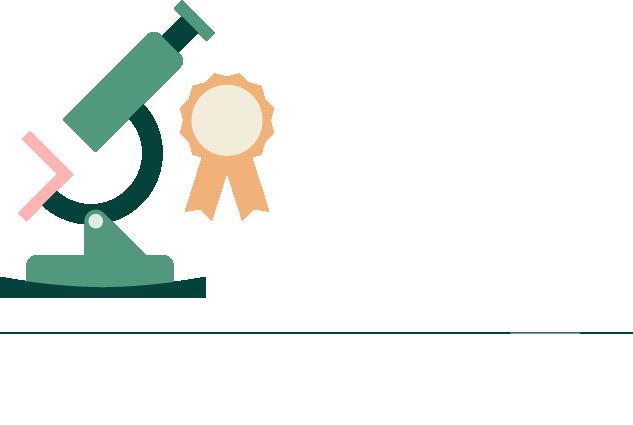
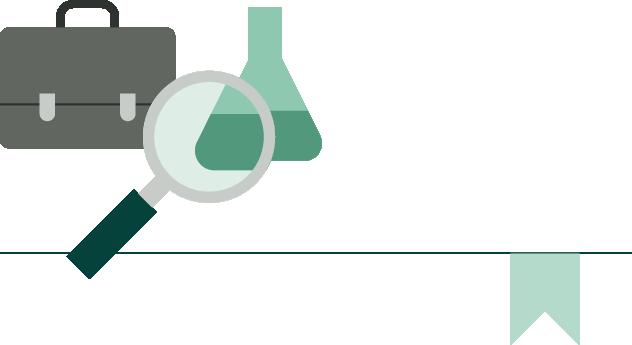
Top-tier neuroscience Close collaboration between research and business
We create value when we fund Danish-based research that results in a better understanding of the brain and better prevention, diagnosis and treatment of brain diseases.
Our ambition is that, by 2030, Lundbeck Foundationfunded research will have led to a better understanding of the brain and to groundbreaking new programmes and treatments in clinical trials or on their way to the market
We create value when we invest in research talents, entrepreneurs and innovation in Danish healthcare, and when we strengthen the collaboration between universities, hospitals and companies in Denmark.
Our ambition is that, by 2030, the Lundbeck Foundation will have contributed to innovative healthcare solutions and/or started new healthcare companies in Denmark
Adding value towards 2030
With the Foundation’s 2030 strategy, “Bringing Discoveries to Lives”, the Foundation articulated a clear commitment to making a positive and sustainable impact on society. This report presents how sustainability is embedded in the Foundation’s purpose,

Active public voice
strategy, business model and activities. The strategy “Bringing Discoveries to Lives” is centred on five valueflags marking the route for the strategic journey while building on the Foundation’s prior achievements.
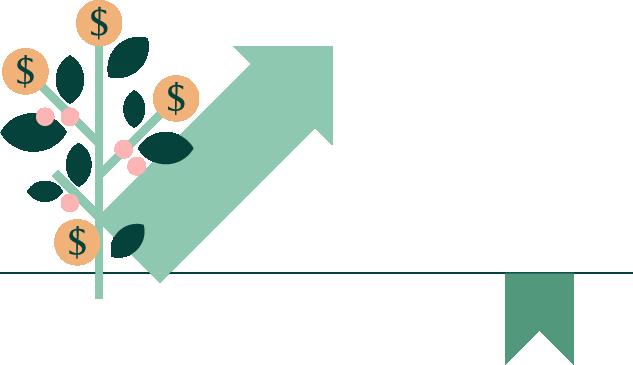

Attractive financial returns Leading healthcare companies
We create value when we develop and internationalise Danish healthcare research and business culture and when we improve society's understanding of the brain and its diseases
Our ambition for 2030 is that the Foundation has increased the public understanding of the importance of brain health, improved the conditions for research in Denmark and further developed the role of enterprise foundations
We create value when our return on investment enables us to increase our grants to society and secures our long-term economic robustness and growth.
Our ambition for 2030 is for our investment activities to deliver a competitive return equal to or better than that of relevant peers, and that we at least double our annual fixed grants and our assets
We create value when, as a competent and engaged owner, we develop and grow healthcare companies to become international market leaders within their categories.
Our ambition is that, by 2030, we will be a long-term and significant owner of a portfolio of 5-8 small or large healthcare companies, preferably in Denmark, that are international market leaders or on their way to becoming leaders
Lundbeck Foundation Sustainability Report 2023 Page 4
The Lundbeck Foundation’s SDG impact
The purpose, business model and strategy of the Foundation provide a clear direction for the societal impact that is pursued within health, innovation, economic growth and good governance. The Foundation is a committed signatory of the UN Global Compact since 2012 and its material sustainability issues are anchored in four Sustainability Development Goals (SDG)
The purpose of the Lundbeck Foundation: We create powerful ripple effects that bring discoveries to lives through investing actively in business and science at the frontiers of their fields
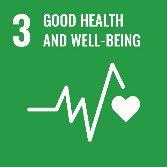
The Foundation’s philanthropic and commercial activities, developing top-tier neuroscience and leading healthcare companies, supports SDG 3 - especially sub-target 3.4 regarding treatment of non-communicable diseases and mental health.
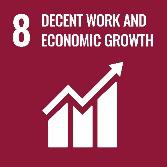
As part of its engaged ownership and responsible asset management, the Foundation contributes to SDG 8 through the sub-targets 8.1 - GDP growth - and 8.5 - Decent work for all men and women.
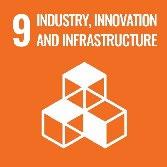
Long-term ownerships, biotech investments, and support for collaboration in research are key components of the Foundation’s impact on society, with a clear link to SDG 9 and sub-target 9.5 of encouraging innovation and research development.
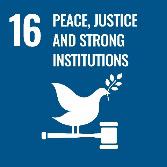
The footprint of the Lundbeck Foundation is primarily defined by the companies it owns, the investments it makes, and the recipients of its grants. The basis for promoting sustainable development is good governance in line with SDG 16, contributing to effective, accountable, and inclusive organisations.
Lundbeck Foundation Sustainability Report 2023 Page 5
Our business model
The Lundbeck Foundation is one of Denmark’s largest enterprise foundations with close to DKK 59bn in assets under management in 2023. The Foundation has a broad scope of activities and its societal impact should be seen through all its activities.
Strategic Ownerships
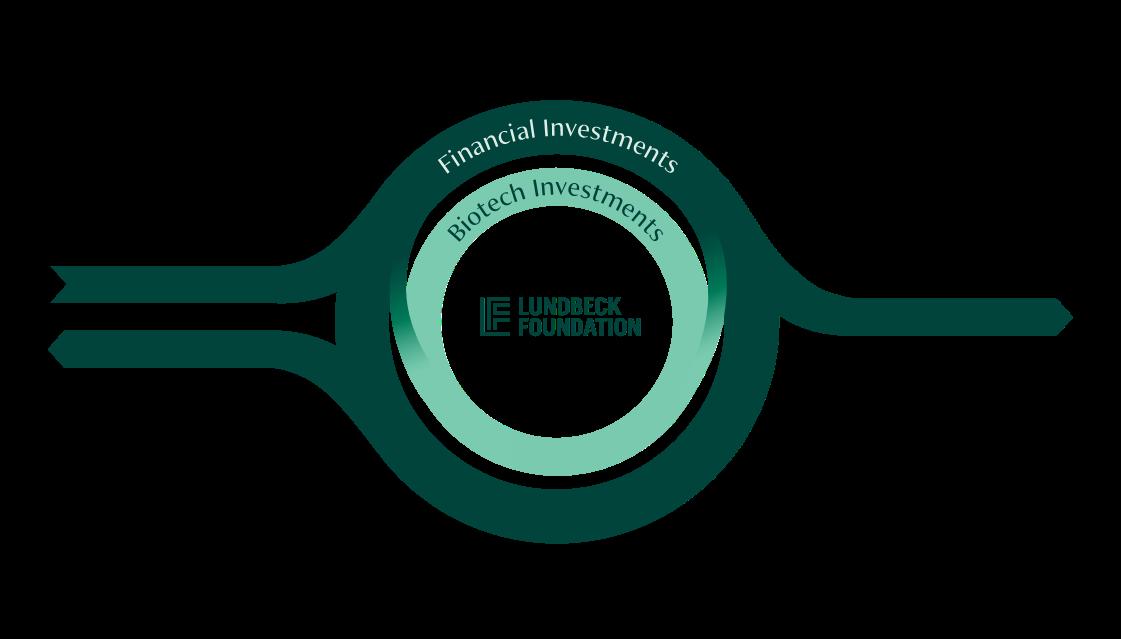
The Lundbeck Foundation is a long-term owner of multiple healthcare companies headquartered in Denmark. Our ambition is to position and maintain the companies as international market leaders within their industry segment. Business ownerships is a key element of the Foundation's financial and societal value creation and of building the route to market for new treatments and therapies for patients all over the world.
Asset Management
Financial investments is the engine that ensures long-term financial stability and allows the Foundation to invest in the future of healthcare and support new scientific research. The Foundation's biotech investments contribute to the financial value creation while also developing people and businesses in the Danish life science ecosystem.
Partner to Society
Partner to Society
• Supporting public research and science through grants and activities to bring forward new discoveries
• Disseminating knowledge through programmes and activities
• Strengthening a vibrant Danish ecosystem for life science, research, innovation, and economic growth
The Foundation channels profits back to society through grants and partnerships, which are anchored in the Foundation’s purpose of 'Bringing discoveries to lives'. Our strategic ambition is to improve the world's understanding of the brain and create better treatments of brain disorders while also developing the Danish life science ecosystem through advancing and enhancing the conditions for science, innovation and economic growth in Denmark.
Lundbeck Foundation Sustainability Report 2023 Page 6
Strategic Ownerships
As a business owner in the healthcare sector, the Lundbeck Foundation impacts economic growth, innovation and job creation in Denmark and in other geographies. This ownership role entails a responsibility to ensure that the companies assess and report on their sustainability impact risks and opportunities, and address these through policy, actions and targets.
Responsible growth and job creation
Engaged ownership is the core of the Foundation’s contribution to its healthcare companies. The goal is to position and maintain the companies as international market leaders within their industry segments, and this includes a strong focus on sustainability.
The governance model
Sustainability is an important pillar of the Foundation’s engaged ownership model, and the Foundation encourages its subsidiaries to assess, evaluate and report on relevant sustainability measures and initiatives in their respective annual reports and as part of their sustainability reporting. The Foundation uses its Board representation to advance sustainability agendas and expects its ownerships to live up to the minimum
standards that are defined in the Foundation’s sustainability policy.
For detailed descriptions of the business models and governance of the three subsidiaries, please refer to the 2023 H. Lundbeck A/S sustainability report, the 2023 ALK Abelló A/S sustainability report and the Management’s review of Falck A/S’ Annual Report 2023.



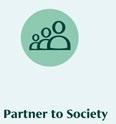

Case: Science based targets initiative
The Science Based Targets initiative (SBTi) is an international partnership established to provide companies with a clear path to reduce their greenhouse gas emissions. Reduction targets approved by the Science Based Targets initiative remain in line with what the latest climate science deems necessary to meet the goals of the Paris Agreement.
In 2023, the environmental targets of the five strategic ownerships are all approved by or in alignment with the Science Based Targets initiative. Moreover, Lundbeck, ALK, Falck, and Ellab have committed their emission reduction targets to the SBTi, while Ferrosan Medical Devices has revised its environmental targets to align with the requirements and guidelines set by the SBTi. As a result, SBTi constitutes an important and shared focus area for all five strategic ownerships, who have different levels of maturity.
Lundbeck Foundation Sustainability Report 2023 Page 7
Subsidiaries by the numbers in 2023 Revenue growth Number of FTEs Patients reached R&D spend (DKKm) R&D % of revenue 9% 5,566 +8 million 3,457 17% 7% 2,752 +2 million 618 13% -6% 19,953 +9 million - -
Asset management


The Lundbeck Foundation’s asset management has a dual purpose.
Firstly, the Foundation’s financial investment activities ensure the financial robustness to pursue the Foundation’s purpose and strategy.
Secondly, the Foundation’s biotech investments advance Denmark’s life science ecosystem while also delivering a strong and competitive financial return.
Investments as a financial engine
The Foundation’s value creation relies on its financial assets, which enables the commercial and philanthropic activities. Financial returns allow the Foundation to support its business ownerships while also investing in new science and innovation, even in times of crisis. This was also the case in 2023, when markets were impacted by insecurity and volatility.
A responsible financial investor
As a diversified financial investor, the Foundation pursues a strategy of investing in high quality companies across different sectors to generate longterm return without compromising strong near-term risk management. All financial investments must comply with the Foundation’s ESG principles and
investment policy, which are reviewed and approved by the Board of the Foundation on an annual basis. Investment decisions and recommendations are also reviewed by the Board’s Investment Committee, which supervises the Foundation’s activities in accordance with the investment policy.
As defined in the Foundation’s investment policy, the Foundation does not invest in certain sectors, such as the tobacco industry. The investment portfolio is screened twice a year to ensure compliance with international ethical standards. Assets that are flagged as high risk in the external screening process undergo a separate due diligence process which is signed off by the Foundation’s CEO.

Lundbeck Foundation Sustainability Report 2023 Page 8
Biotech investments
Supporting the local life science ecosystem while also delivering a competitive financial return is at the core of the Foundation’s biotech investments Through new investments and its existing portfolio of 20 international and Danish biotech companies, the Foundation advances health innovation through commercial and sustainable businesses with the aspiration of pushing the boundaries of the current level of insights and knowledge and identifying the health solutions of tomorrow.
An active biotech investor and owner
The Foundation identifies companies and teams with a strong scientific platform and commercial potential that can solve unmet medical needs. Solving future patient needs requires excellent science, robust business models and sustainable practices.
The Foundation’s investment takes place after an indepth due diligence assessment of the science, team and business model that also involves relevant ESG considerations. Each investment is accompanied by the Foundation’s involvement in the company. This usually involves a board seat, which allows the Foundation to advance and guide strategy, operations and policies and to build up sustainable priorities and practices in the portfolio companies.
Case: Closing the women’s health gap
In 2023, the Foundation invested in Notify Therapeutics, a young Danish biotech company that develops a novel hormone-free fertility treatment for women, contributing to an area with a historic lack of innovation and investment. A recent study by the McKinsey Health Institute1 estimates that closing the health gap between genders would improve the lives of millions of women and could boost the global economy by more than $1 trillion in 2040.
1 McKinsey Health Institute 2024, https://www.mckinsey.com/mhi/our-insights/closing-the-womens-health-gap-a-1trillion-dollar-opportunity-to-improve-lives-and-economies?cid=eml-web

Lundbeck Foundation Sustainability Report 2023 9
Partner to Society
The Lundbeck Foundation channels profits back to society through grants, partnerships and societal activities which are anchored in the purpose of ‘Bringing discoveries to lives’. This includes three types of activities: Investing in scientists and their pursuit of new discoveries, disseminating knowledge and discoveries to those who need them, and strengthening Denmark’s life science ecosystem through innovation and economic growth.
The Commitment to Brain Health
Brain diseases are estimated to affect more than 3 billion people worldwide. This has profound socioeconomic impacts for society at large and severe personal consequences for patients and relatives. The world has a strong need for new treatments, which requires better knowledge about the brain and its diseases. The Foundation supports scientific research with a specific commitment to the brain. The Foundation supports projects across basic, clinical applied and epidemiological research activities. In 2023, a total of DKK 592m was awarded, out of which DKK 485m was committed to neuroscience.
82%


Case: Measuring impact
In 2023, the Foundation introduced new impact measures that complement and extend the traditional bibliometric indicators to enable a broader understanding of successful scientific research.
The Foundation requires grantees to present a plan for how anticipated project outcomes can lead to impact on human health. This contributes to the translation from scientific research to patient impact. Grantees are asked to focus their attention on who and how their anticipated outcomes will benefit, thus enabling further research and impacting patients.
This approach is dynamic and will continually be adapted as the Foundation integrates the new concepts into practice. To that end, the Foundation engages in dialogue and knowledge exchange with national and European foundations, e.g. through national networks, the European foundation association, Philea, and the CoARA initiative.
Lundbeck Foundation Sustainability Report 2023 Page 10
1 Including applications where gender is not applicable relevant Grant activities in 2023 We received 827 applications1 507 from men 306 from women We granted 592 DKKm 23% to basic research 69% to clinical research 239 postdocs
other academic staff
PhD students
pre-graduates students
technical & administrative staff Funding
and resulting in 652
157
154
55
39
644FTEs
scientific publications
to neuroscience
to other
and
18%
activities
scientific research
Accountability, transparency, and integrity
In its grant activities, the Foundation is committed to integrity, transparency and accountability. The Foundation wants to support the best scientific research that can shape positive outcomes and push the frontiers for our knowledge. Best practices, such as the Danish Code of Conduct for Research Integrity, as well as environmental, social and governance considerations, are integrated into the Foundation’s grant processes.
The Foundation handles and evaluates applications via an application assessment process, with the evaluation including peer reviews by international third-party expert panels who operate in compliance with the Foundation’s principles of impartiality. For this purpose, the Foundation has established four permanent evaluation panels with independent experts.
Disseminating knowledge and discoveries
Bringing discoveries to lives requires new knowledge as well as the continuous sharing of new knowledge to those who need it: clinicians, healthcare professionals, patients and relatives, companies, public authorities, etc. In 2023, the Foundation continued its efforts to share new and important knowledge about the brain and brought new scientific insights to a broader audience in Denmark and globally.
Supporting collaboration between research and business
Healthcare innovation requires collaboration between the scientific research community and the commercial
business world. This is seen in the world’s most innovative healthcare communities, where talents can make the leap from science to business and back again.
In today’s world, companies and innovative entrepreneurs shape the route from scientific labs to patients, which requires a profound understanding of multiple sectors as well as a strong commitment to entrepreneurship and business building.
To further strengthen this route, the Foundation established new grants of up to DKK 5m each, Frontier Grants, in 2022, with the objective of supporting and facilitating the scientific transition from basic research project to an attractive prospect for biotech investors. In 2023, the Foundation awarded four Frontier Grants to scientists working on innovative new treatments related to CGRP (migraine), Huntington’s disease, liver fibrosis and cardiac diseases.
Case: Neurotorium
New life science knowledge creates value when it is shared, understood and leveraged by healthcare professionals, clinicians and other users around the globe.
Fewest users Most users
In 2022, the Lundbeck Foundation launched Neurotorium, a freely accessible online platform with the latest scientific knowledge about the brain and its diseases. The platform covers topics within psychiatry, neurology and neuroscience and offers educational content that is curated and developed by the world’s leading experts, and it is accessible free of charge by all users. The initiative targets clinicians, healthcare professionals and educators, but can be used by anyone who is interested in learning about the brain.
In 2023, the Neurotorium platform had more than 190.000 active users across 181 countries. Top 5 countries were USA, India, the UK, Brazil and Mexico.
Lundbeck Foundation Sustainability Report 2023 Page 11
Total Neurotorium users in 2023
Supporting research projects in their very early phases is important to address unmet needs in the healthcare community. However, with its focus on research at Danish universities, it also supports the development of Denmark’s life science ecosystem.
Celebrating neuroscience
The Foundation has many activities focused on the need to bring knowledge and awareness of brain health to the wider society. The Foundation is the founding partner of the world’s largest prize for brain researchers, ‘The Brain Prize’, which is awarded annually to scientists who have made groundbreaking discoveries in brain research. The award is followed by an extensive outreach programme, where the winners share their science with global audiences.
An Active Contributor
As one of Denmark’s largest enterprise foundations, we contribute to Denmark’s business community in healthcare, including the nurturing of a vibrant life science ecosystem based on excellent scientific research, successful innovation and sustainable business growth.
A responsible Public voice
• Research conditions for life science in Denmark: The Foundation interacts with the worlds of science and business and offers access to funding, talent programmes for scientists and shares insights and knowledge in order to improve and build excellent conditions for scientific research and life science innovation.
• Enterprise Foundations have a long history of value creation in Danish life science, and the Lundbeck Foundation is committed to protecting and developing this particular ownership model for the benefit of Denmark’s welfare state, its life science industry and society as a whole.
The Foundation’s public voice is planned and conducted with strong attention to principles of transparency, accountability and integrity.
The Foundation has identified three main agendas where it has an important role today:
• The importance of brain health The Foundation invests in neuroscience and brain research and shares new insights with the world with the aspiration to grow relevant stakeholders’ understanding of the brain for the benefit of patients and their relatives.
Case: An enhanced focus on talent management in life science
The future of the local life science community is dependent on its ability to attract and develop talents who can foster and nurture health innovation and build the commercial routes from labs to markets. This requires a strong focus on talent development at all levels – at universities, in biotech companies and in the larger healthcare companies. It also requires an ability to attract international talents with relevant scientific and commercial skills, competencies and insights.
To this end, the Foundation brought together leadership representatives from universities and biotech and pharmaceutical companies
around a comparative analysis, which was concluded in 2023. The analysis compared talent management and diversity practices within different sectors in the Danish life science community, thus fostering new learnings and knowledge sharing between the different industry sectors.
Together with the Novo Nordisk Foundation, the think tank Axcelfuture and Danish law firm Kromann Reumert, the Lundbeck Foundation initiated a whitepaper targeting Denmark’s public authorities. The whitepaper highlights the importance of international talents for Denmark’s life science community and suggests a number of possible adjustments and quick wins that can improve the attraction and retention of relevant international talents. The white paper was launched in January 2024 at the Danish Parliament, Folketinget, where it was well received and is now being processed by the relevant authorities.
Case: A stronger voice FOR brain health in Denmark
Despite far-reaching societal and personal consequences for people around the world, brain health and brain diseases remain an under prioritised disease area in Denmark and in many other countries. This is also due to the fact that the brain and its diseases is one of the least understood scientific areas in terms of biomedical knowledge and treatments.
In order to increase focus on and attention to brain health, the Foundation has initiated a new dialogue between Denmark’s many patient organisations that are affected by brain health topics. The objective is to strengthen their voices in the public debate and work together around the joint challenge of brain health and knowledge of the brain and its diseases. The Foundation hosted and facilitated two roundtable sessions in 2023 focused on discussing the societal costs of brain diseases and the impact of Denmark’s public health commissions (‘Robusthedskommissionen’ and ‘Sundhedsstrukturkommissionen’).
Lundbeck Foundation Sustainability Report 2023 Page 12
ESG at the Lundbeck Foundation
A history of good governance & principles
Good governance is critical for the effective integration of sustainability into the business decisions of the Foundation. The Foundation’s governance model has been developed over many years and is based on four principles:
• Compliance with Denmark’s national Recommendations on Foundation Governance and on Corporate Governance ensures clear guidelines for the Foundation’s operations.
• The principle of independence guides the composition of the Foundation’s governing bodies, including board composition, scientific evaluations etc.
• Annual accounts, key policies and governance documents are developed to comply with the principle of transparency, and the Foundation’s six policies are shared publicly and can be accessed at the Foundation’s website: https://lundbeckfonden.com/about-us/socialresponsibility-and-transparency/policies
• The decision-making processes in the Foundation’s organisation are defined and reflect the principle of checks and balances
ESG Governance at Lundbeck Foundation
The Foundation’s Board of Directors endorses the Foundation’s sustainability policies, priorities and progress. The CEO is responsible for the Foundation’s sustainability work and ensures that ESG is integrated into strategy, management and business model. The Management Team reviews implementation and follows up on progress. The Sustainability Steering Group is responsible for advancing the sustainability agenda and programme, manages key priorities and sustainability initiatives, tracks progress and reports to the CEO.
Workstream Leads lead and drive sustainability initiatives in their departments.
In addition, the Foundation works to integrate and update ESG measures according to the latest development in the core process for each of its activities.
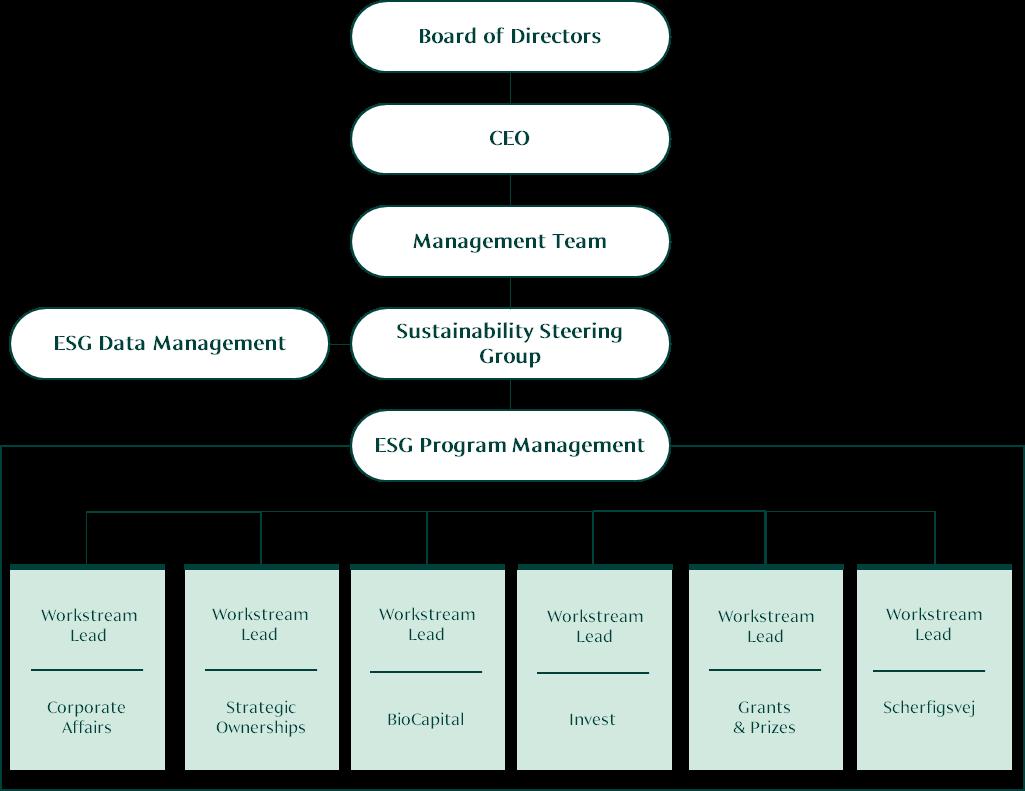
Lundbeck Foundation Sustainability Report 2023 Page 13
Key initiatives in 2023 for the Foundation
The Foundation started to prepare for reporting in accordance with the Corporate Sustainability Reporting Directive (CSRD) which will be implemented in the Foundation’s annual reporting for the year 2025. It will require solid preparation, and the Foundation will carry out a double materiality assessment in 2024, which will contribute to shaping the basis for the Foundation’s sustainability priorities and activities in the future.
The Foundation also initiated carbon offsetting to counterbalance the emissions from unavoidable flights related to the Foundation’s international activities.
The Foundation created a new position in its organisation and recruited a Sustainability and Strategy Lead to co-drive and coordinate sustainability efforts across the Foundation going forward.
The Lundbeck Foundation Sustainability Policy
In 2023, the Foundation published its first Sustainability Policy, which defines the guiding principles for the Foundation’s work on all sustainability areas. The policy was made publicly accessible on the foundation’s website: https://lundbeckfonden.com/about-us/socialresponsibility-and-transparency/policies
The sustainability policy articulates the expectations and guiding principles for the Foundation’s employees, its grant recipients, investments and ownerships and encourages its partners and stakeholders, including the strategic ownerships and investments, to pursue
sustainability agendas that can live up to the minimum standards set out in the policy.
The Sustainability Policy is reviewed and approved by the Board of Directors annually. The Sustainability Policy can be accessed here:
https://lundbeckfonden.com/about-us/socialresponsibility-and-transparency/policies
Whistleblower system
The Foundation has a whistleblower system that provides employees, partners and stakeholders with a secure and confidential channel to flag and raise concerns, including legal and other serious risks, to the Foundation’s CEO and Board of Directors. The whistleblower system is managed by an independent third-party provider. In 2023, no reports were made via the whistleblower system.
ESG figures for the Lundbeck Foundation
As an enterprise foundation, the Foundation’s emissions lie in Scope 2 and 3. In 2023, the Foundation continued to reduce scope 2 emissions through initiatives related to heating, transportation and resource management, and the Foundation’s efforts resulted in a 46% reduction compared with 2019. The Foundation will look at how to handle Scope 3 emissions as part of the process of getting ready for reporting under CSRD (Double Materiality Assessment) in 2024.
Diversity at the Lundbeck Foundation
In 2023, the Foundation’s Board of Directors comprised seven board members, who are elected based on the
Data ethics
In response to the Danish Financial Statements Act §99d, the Data Ethics Policy for the Lundbeck Foundation (including Lundbeckfond Invest A/S) has been developed and approved by the Board of Directors. It is based on five principles:
• Human interests before commercial interest. Data utilised should ultimately have a human benefit. If there is a conflict between human and commercial interests, human interests should always prevail.
• Transparency. Data uses should be clear or easily explained. When personal data is utilised, the legitimate reason for doing so should be made clear, or properly informed consent should be obtained from all involved.
• Anonymisation Data should be anonymised or pseudonymised unless personalisation is a requirement for achieving the targeted results.
• Autonomy. The Lundbeck Foundation believes that individuals should have control over the use of their data. Further, the Foundation does not use automated decision-making or artificial intelligence on data either provided or collected.
• Accountability and governance. Accountability is an integral part of responsible data use, and the Foundation goes to great lengths to reduce the risks for the individual and to mitigate undesirable social and ethical implications.
The Lundbeck Foundation endeavours to integrate data ethics into all its daily management and business decisions, including when acting as stakeholder in other concerns. Even with effective standards, policies and processes in place, data usage has the potential to lead to challenges, problems and errors. The Foundation seeks to prevent this by developing a positive culture among employees that promotes openness and encourages the continuous improvement of processes and systems.
Subsidiaries
For further information about the Data Ethics Policy, please see page 39 of Lundbeck’s Sustainability report 2023, page 30 of ALK’s Sustainability report 2023 and page 55 of Falck’s Annual report 2023.
Lundbeck Foundation Sustainability Report 2023 Page 14
Foundation’s status. In 2023, six of the seven board members were considered independent. The seven board members counted one woman and six men, excluding the four employee representatives who represent the Foundation’s three subsidiaries.
The gender balance is not in accordance with the guidelines on gender equality issued by the Danish Business Authority (‘Guidelines on target figures, policies and reporting on the gender composition of management’) and adjusting the gender balance of the Board of Directors is therefore a priority going forward.
When electing new members to the Board of Directors, the Board strives to ensure diversity in competencies as well as gender. The board will continue to pursue equal representation in the coming elections. This was also the case in 2023.
In the short term, the Board of Directors strives towards complying with the guidelines by having at least two members of each gender among the seven members elected according to the statutes. Currently, the Board expects this target will be realised by no later than 2027.
In the day-to-day operations, the management members of the Lundbeck Foundation and Lundbeckfond Invest A/S operates as one team. The Management Team comprises seven members including the CEO and counts two women and five men. Management members employed by the Foundation comprises of four persons with equal gender representation. In total, the two entities count 23
females out of a total of 47. Diversity and inclusion will remain focus areas for the Foundation in the years to come.
Since the Foundation (the Parent Foundation) has less than 50 employees, it falls below the employee threshold in section 99b and therefore no additional reporting is required.
Lundbeck Foundation Sustainability Report 2023 Page 15
ESG key figures1 overview for the Foundation Unit 2023 2022 2021 2020 2019 Environmental data CO2e Scope 1 Tonne 0 0 0 0 0 CO2e Scope 2 Tonne 27 32 33 31 49 Energy consumption GJ 767 838 841 822 986 Renewable energy share % 18 18 17 18 9 Water consumption m3 341 336 284 264 261 Social data Workforce FTE 47 43 41 37 37 Gender diversity, percentage of women in the workforce % 46 44 41 45 46 Members of the Management Team FTE 7 7 6 6 7 Gender diversity, percentage of women in the Management team % 29 29 50 50 57 Gender pay ratio of men to women Times 1.8 1.8 1.6 1.7 1.8 Employee turnover ratio % 15 15 11 11 17 Absence due to sickness % 1 2 1 1 1 Governance data Members of the Board of Directors FTE 7 7 7 7 7 Gender diversity, Board of Directors % 14 29 29 29 29 Board meeting attendance rate % 97 96 96 98 91 CEO pay ratio Times 19.4 17.9 19.1 14.4 12.2
1 These key ESG figures are based on recommendations by the Chartered Financial Analysts’ (CFA) Society Denmark, the Association of Danish Auditors (FSR), and Nasdaq Copenhagen. They represent a first step in a process that, over the coming years, will enable the Foundation to provide stakeholders with further insights into the Foundation’s ESG profile by setting targets.
Definitions of calculations
Reporting period
All reported data cover a full-year period (1 January to 31 December 2023) for the Foundation (Lundbeckfonden and Lundbeckfond Invest A/S). The calculations have been applied consistently for all the years presented. All KPIs reported in the Sustainability Report are gathered and aligned with the timeline for the annual reporting of the financial data.
Data quality
We are committed to collecting the most accurate data. Nevertheless, it is not always possible to gain a fully aligned register of data, and estimations are sometimes necessary.
Environmental data
CO2e Scope 2
Includes all indirect emissions related to the generation of acquired and consumed electricity and district heating. All consumed energy information is provided by suppliers as specific meter readings or invoices.
Energy consumption
Consumed energy is monitored by building-specific meter readings.
Renewable energy share
Share of renewable energy generated by solar panels is monitored by building-specific meter reading.
Water consumption
Water consumption is monitored by building-specific meter readings.
Social data Workforce
The workforce is calculated using the FTE method, which consists of the total amount of ATP reported to the Danish Tax Authorities divided by the standard ATP rate for a full-time employee (FTE) per year.
Gender diversity, percentage of women in the workforce
Includes all permanent employees hired and paid directly by the Foundation. Gender is assigned as female or male. Gender diversity reported as female share of total workforce.
Gender diversity, percentage of women in the Management Team
Includes all women in the Management Team. Gender is assigned as female or male. Gender diversity in the Management Team is reported as female share of total Management Team.
Gender pay ratio of men to women
Includes all permanent employees hired and paid directly by the Foundation. Gender is assigned as female or male. Gender pay ratio is calculated as the median of paid salary to male employees divided by the median of paid salary to female employees.
Employee turnover ratio
Includes all permanent employees hired and paid directly by the Foundation. Employee turnover ratio is calculated for both voluntarily and involuntarily departing employees.
Absence due to sickness
Includes all permanent employees hired and paid directly by the Foundation. Absence due to sickness is calculated as the number of full days of sickness for all employees, divided by the total number of FTEs. Maternity leave is not included.
Governance data
Gender diversity, Board of Directors
The gender diversity of the Board of Directors is calculated as the total number of women elected divided by the total number of members of the Board of Directors for the Foundation. Gender is assigned as male or female.
Board meeting attendance rate
The board meeting attendance rate is calculated as the number of board meetings that each board member attends, divided by the total number of board meetings during the year.
A specific overview of each board member’s attendance during 2023 is presented in the Annual report of the Foundation on page 41.
CEO pay ratio
Total CEO remuneration divided by the median of the Foundation’s employee remuneration.
Lundbeck Foundation Sustainability Report 2023 Page 16
Management review Financial statements Financial statements Lundbeck Foundation Group Financial statements of the Parent Foundation Management statement Independent auditor’s report Lundbeck Foundation Sustainability Report 2023 Page 17 Lundbeckfonden Scherfigsvej 7 2100 København Ø CVR 11814913






















